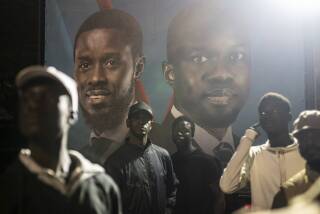Egypt’s Mohamed ElBaradei exits race for president
Nobel Peace Prize laureate Mohamed ElBaradei quit the race for the Egyptian presidency Saturday in protest of the military’s persistent grip on power despite a year of revolution and political upheaval.
ElBaradei’s announcement was a strategic and emotional setback for liberal and secular activists who had hoped the former head of the United Nations nuclear watchdog agency would propel the country toward democratic reforms to replace the corrupt legacy of deposed President Hosni Mubarak.
“I have decided not to run for the post of the president of the republic,” ElBaradei said in a statement. “My conscience does not permit me to run for the presidency or any other official position unless it is within a democratic framework.”
ElBaradei’s chances of winning the presidential election, scheduled for June, had dimmed in recent weeks. He could not muster the organizational prowess and appeal of Islamist parties, most notably the Muslim Brotherhood, the country’s dominant political force.
His announcement follows the turbulent arc of a protest movement that was unified in its early days but splintered as political and religious parties struggled against the omnipresent Supreme Council of the Armed Forces. ElBaradei has been an articulate voice against the power elite, but he has been outflanked by generals and the well-organized Brotherhood.
“ElBaradei feels there is an ongoing political game behind the scenes,” said Nabil Abdel Fattah, an analyst at the Al Ahram Center for Political and Strategic Studies in Cairo. “He decided not to take part in the game where a powerless and weak president will be chosen by the Brotherhood and SCAF to serve their interests.”
The former head of the U.N.’s International Atomic Energy Agency said the military’s hold on the country had become so pervasive, and so reflective of Mubarak’s police state, that it appeared as if “no revolution took place and no regime has fallen.”
ElBaradei has often posted Twitter missives criticizing the army for deadly crackdowns on protesters and for what he sees as media manipulation. When he returned to his native Egypt in 2010 after years of living abroad, he led the National Front for Change and was viewed as a fresh, uncorrupted and internationally respected voice.
But many regarded him as an outsider. He lacked charisma, never appeared comfortable rallying the masses and often differed with opposition leaders over how to challenge Egypt’s autocratic regime. ElBaradei was criticized for leaving the country at crucial times; he later worked behind the scenes with a cadre of young social media activists that helped spark the uprising that led to Mubarak’s overthrow.
“This isn’t the first time ElBaradei disappoints me. He was not among the people when he was needed the most on so many occasions,” said Mohamed Tarek Saied, a 26-year-old engineer. “We believed in the man’s great vision and ideas, but sometimes I felt that he wanted to live in heaven, where everyone is flawless.”
ElBaradei could not bridge the chasm between secularists and religious conservatives. The Muslim Brotherhood, which appears to have won about 45% of the seats in the elections for a new parliament, considers him too liberal for the emerging political Islam it envisions. ElBaradei’s brand of Western-style democracy resonated with the youths and intellectuals in Cairo’s Tahrir Square but played less well in the rural regions and provinces dominated by the Islamists.
The withdrawal of ElBaradei from the race is an “unpleasant surprise to all activists,” said Habi George Philippe, an activist and member of the Egyptian Social Democratic Party. “It is a shock for millions of revolutionaries like me who believed that ElBaradei was the only candidate capable of implementing a real post-revolution democracy.”
With his trademark eyeglasses and natty attire, ElBaradei was very much the diplomat. In the early days of last year’s revolt, he faced tear gas, water cannon and batons but preferred negotiation over the violent confrontations and rousing speeches of street protests. He quickly warned against the army’s designs on power and blamed it for spoiling the revolution.
“Instead of uniting the nation through an organized political process … [the military council] has taken all decisions alone in a way that reflects confusion, and exacerbated divisions in the society while we are in dire need of solidarity,” said ElBaradei, who was awarded the Nobel Peace Prize in 2005 for his work with the IAEA.
Amro Hassan of The Times’ Cairo bureau contributed to this report.
More to Read
Start your day right
Sign up for Essential California for news, features and recommendations from the L.A. Times and beyond in your inbox six days a week.
You may occasionally receive promotional content from the Los Angeles Times.







